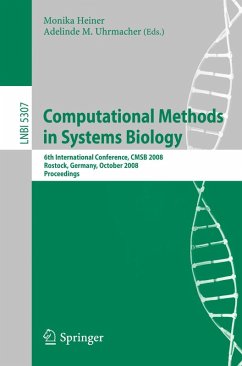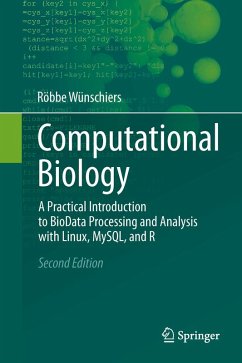
Mathematical Approaches to Biological Systems (eBook, PDF)
Networks, Oscillations, and Collective Motions
Redaktion: Ohira, Toru; Uzawa, Tohru
Versandkostenfrei!
Sofort per Download lieferbar
72,95 €
inkl. MwSt.
Weitere Ausgaben:

PAYBACK Punkte
36 °P sammeln!
This book presents the most recent mathematical approaches to the growing research area of networks, oscillations, and collective motions in the context of biological systems. Bringing together the results of multiple studies of different biological systems, this book sheds light on the relations among these research themes.Included in this book are the following topics: feedback systems with time delay and threshold of sensing (dead zone), robustness of biological networks from the point of view of dynamical systems, the hardware-oriented neuron modeling approach, a universal mechanism govern...
This book presents the most recent mathematical approaches to the growing research area of networks, oscillations, and collective motions in the context of biological systems. Bringing together the results of multiple studies of different biological systems, this book sheds light on the relations among these research themes.
Included in this book are the following topics: feedback systems with time delay and threshold of sensing (dead zone), robustness of biological networks from the point of view of dynamical systems, the hardware-oriented neuron modeling approach, a universal mechanism governing the entrainment limit under weak forcing, the robustness mechanism of open complex systems, situation-dependent switching of the cues primarily relied on by foraging ants, and group chase and escape.
Research on different biological systems is presented together, not separated by specializations or by model systems. Therefore, the book provides diverse perspectives at the forefront of current mathematical research on biological systems, especially focused on networks, oscillations, and collective motions.
This work is aimed at advanced undergraduate, graduate, and postdoctoral students, as well as scientists and engineers. It will also be of great use for professionals in industries and service sectors owing to the applicability of topics such as networks and synchronizations.
Included in this book are the following topics: feedback systems with time delay and threshold of sensing (dead zone), robustness of biological networks from the point of view of dynamical systems, the hardware-oriented neuron modeling approach, a universal mechanism governing the entrainment limit under weak forcing, the robustness mechanism of open complex systems, situation-dependent switching of the cues primarily relied on by foraging ants, and group chase and escape.
Research on different biological systems is presented together, not separated by specializations or by model systems. Therefore, the book provides diverse perspectives at the forefront of current mathematical research on biological systems, especially focused on networks, oscillations, and collective motions.
This work is aimed at advanced undergraduate, graduate, and postdoctoral students, as well as scientists and engineers. It will also be of great use for professionals in industries and service sectors owing to the applicability of topics such as networks and synchronizations.
Dieser Download kann aus rechtlichen Gründen nur mit Rechnungsadresse in A, B, BG, CY, CZ, D, DK, EW, E, FIN, F, GR, HR, H, IRL, I, LT, L, LR, M, NL, PL, P, R, S, SLO, SK ausgeliefert werden.













